Civil Engineering Gate Yearwise
Civil Gate 2025 Set-2
Civil Gate 2024 Set-1
Civil Gate 2024 Set-2
Civil Gate 2023 Set-1
Civil Gate 2023 Set-2
Civil Gate 2022 Set-1
Civil Gate 2022 Set-2
Civil Gate 2021 Set-1
Civil Gate 2021 Set-2
Civil Gate 2020 Set-1
Civil Gate 2020 Set-2
Civil Gate 2019 Set-1
Civil Gate 2019 Set-2
Civil Gate 2018 Set-1
Civil Gate 2018 Set-2
Civil Gate 2017 Set-1
Civil Gate 2017 Set-2
Civil Gate 2016 Set-1
Civil Gate 2016 Set-2
Civil Gate 2015 Set-1
Civil Gate 2015 Set-2
Civil Gate 2014 Set-1
Civil Gate 2014 Set-2
Civil Gate 2013
Civil Engineering Gate 2016 Set-2 Questions with Answer
Ques 14 GATE 2016 SET-2
A noise meter located at a distance of 30 m from a point source recorded 74 dB. The reading at a distance of 60 m from the point source would be
Ques 15 GATE 2016 SET-2
For a wastewater sample, the three-day biochemical oxygen demand at incubation temperature of 20°C (BOD3 day, 20°C) is estimated as 200 mg/L. Taking the value of the first order BOD reaction rate constant as 0.22 day-1, the five-day BOD (expressed in mg/L) of the wastewater at incubation temperature of 20°C (BOD5 day, 20°C) would be
Ques 16 GATE 2016 SET-2
The atmospheric layer closest to the earth surface is
Ques 17 GATE 2016 SET-2
A water supply board is responsible for treating 1500 m3/day of water. A settling column analysis indicates that an overflow rate of 20 m/day will produce satisfactory removal for a depth of 3.1 m. It is decided to have two circular settling tanks in parallel. The required diameter (expressed in m) of the settling tanks is
Ques 18 GATE 2016 SET-2
The hardness of a ground water sample was found to be 420 mg/L as CaCO3. A softener containing ion exchange resins was installed to reduce the total hardness to 75 mg/L as CaCO3 before supplying to 4 households. Each household gets treated water at a rate of 540 L/day. If the efficiency of the softener is 100%, the bypass flow rate (expressed in L/day) is
Ques 19 GATE 2016 SET-2
The sound pressure (expressed in μPa) of the faintest sound that a normal healthy individual can hear is
Ques 20 GATE 2016 SET-2
A square plate is suspended vertically from one of its edges using a hinge support as shown in figure. A water jet of 20 mm diameter having a velocity of 10 m/s strikes the plate at its mid-point, at an angle of 30° with the vertical. Consider g as 9.81 m/s2 and neglect the self-weight of the plate. The force F (expressed in N) required to keep the plate in its vertical position is
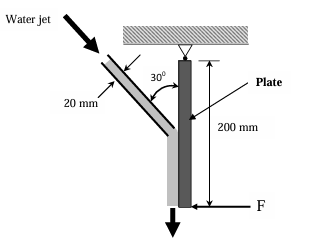
Ques 21 GATE 2016 SET-2
Group I contains the types of fluids while Group II contains the shear stress rate of shear relationship of different types of fluids, as shown in the figure.
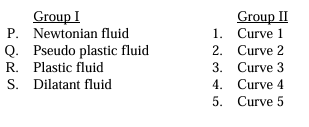
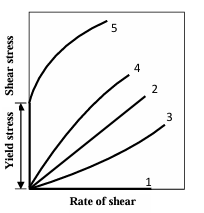
Ques 22 GATE 2016 SET-2
Optimal flight planning for a photogrammetric survey should be carried out considering
Ques 23 GATE 2016 SET-2
Water flows from P to Q through two soil samples, Soil 1 and Soil 2, having cross sectional area of 80 cm2 as shown in the figure. Over a period of 15 minutes, 200 ml of water was observed to pass through any cross section. The flow conditions can be assumed to be steady state. If the coefficient of permeability of Soil 1 is 0.02 mm/s, the coefficient of permeability of Soil 2 (expressed in mm/s) would be
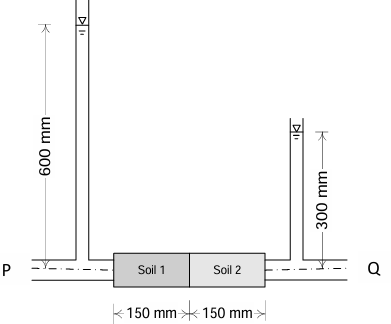
Ques 24 GATE 2016 SET-2
A 4 m wide strip footing is founded at a depth of 1.5 m below the ground surface in a c-ϕ soil as shown in the figure. The water table is at a depth of 5.5 m below ground surface. The soil properties are: c'=35 kN/m2, ϕ'=28.63°, γsat=19 kN/m3, γbulk=17 kN/m3 and γw=9.81 kN/m3. The values of bearing capacity factors for different ϕ' are given below.
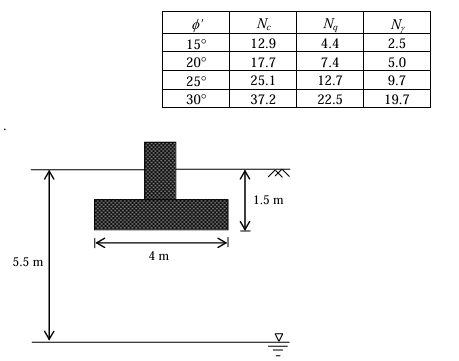
Ques 25 GATE 2016 SET-2
A strip footing is resting on the surface of a purely clayey soil deposit. If the width of the footing is doubled, the ultimate bearing capacity of the soil
Ques 26 GATE 2016 SET-2
The relationship between the specific gravity of sand (G) and the hydraulic gradient (i) to initiate quick condition in the sand layer having porosity of 30% is

Total Unique Visitors